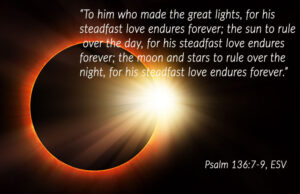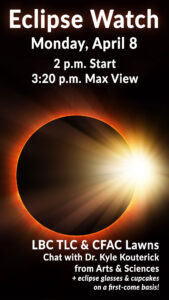On April 8, 2024, parts of North America will have the chance to witness a potentially stunning solar eclipse, and with a corner of Pennsylvania being in the path of totality, Lancaster Bible College’s main campus in the central portion of the state will have an impressive view.
 Dr. Kyle Kouterick, Professor of Natural Sciences since 2001, will be on hand to answer students’ science-related questions that day. Interested students and employees will gather outside the campus’ two main academic buildings—Teague Learning Center and Charles Frey Academic Center—for an Eclipse Watch starting around 2 p.m., when the moon will begin to pass in front of the sun. By approximately 3:20 p.m., the point of maximum visibility, 91% of the moon’s shadow will cover Lancaster County, Pa., giving the college community a sense of late evening light in the middle of the afternoon.
Dr. Kyle Kouterick, Professor of Natural Sciences since 2001, will be on hand to answer students’ science-related questions that day. Interested students and employees will gather outside the campus’ two main academic buildings—Teague Learning Center and Charles Frey Academic Center—for an Eclipse Watch starting around 2 p.m., when the moon will begin to pass in front of the sun. By approximately 3:20 p.m., the point of maximum visibility, 91% of the moon’s shadow will cover Lancaster County, Pa., giving the college community a sense of late evening light in the middle of the afternoon.
Kouterick will set up the college telescope at 2 p.m. for students and staff to take a peek, while over 200 pairs of certified eclipse glasses will also be available on a first-come basis to safely view the eclipse, along with dozens of eclipse-themed cupcakes. Students can also share the glasses throughout the two-hour eclipse window, which will end around 4 p.m. when the moon will no longer block the view of the sun.
Millions of people across the U.S. are living in or will visit locations along the path of totality, which stretches from Torreón, Mexico, to Quebec, Canada, with highly populated cities such as Dallas, St. Louis, Indianapolis, Cleveland, Erie, Buffalo, Toronto and Montreal dotting the path. According to NASA, every U.S. state, including parts of Alaska and Hawaii, will experience at least a partial solar eclipse.
The last solar eclipse visible in the U.S. was in August 2017, with not another on the horizon for North America until 2044, covering parts of the Northern Plains states in the U.S. as well as a swath of Canada.
To prep for this opportunity to take in the beauty and wonder of God’s creation, check out a Q&A below with Dr. Kouterick, who also teaches courses within LBC’s Arts & Sciences Department such as Biology I and II, Anatomy and Physiology I and II, Integrated Science I and II, Environmental Science, Field Ecology and Scientific Disciplines.
Q: Can you briefly explain a solar eclipse and tell us why the upcoming eclipse seems extra interesting?
A: “There are three astronomical bodies involved in an eclipse; the sun, the moon and Earth. A solar eclipse occurs when these three bodies align and the moon passes between the sun and Earth, so the moon casts a shadow onto Earth’s surface. A solar eclipse is not that rare since it occurs at least two times every year somewhere on Earth. However, people typically will not want to travel too far to view the eclipse or it may be over the ocean only. A total solar eclipse, when the moon completely blocks the sun’s disk, only happens every year or two. But April 8 is a special event because the shadow is passing over such a large population across North America. The next time a total solar eclipse occurs this close to Lancaster Bible College will not be until October 26, 2144.
Q: What can people expect to see during the April 2024 solar eclipse?
A: “Because the moon and Earth are both moving, the moon’s shadow will follow a path called the eclipse path. Where the sun is being blocked 100% by the moon, the path of the shadow is called the path of totality. Viewers in the path of totality will have the unique chance to see the outer atmosphere ejecting from the sun, called the corona. The brightness of the sun normally prevents observers from seeing its corona. Viewers on the Lancaster Bible College campus are not in the path of totality but will enjoy seeing a partial solar eclipse of about 91% of the sun. At approximately 3:22 p.m., the deepest point of the eclipse will occur and only a crescent-shaped portion of the sun will be visible from campus. It will darken our sky noticeably. Of course, viewers need to be very careful and only look at the eclipse with proper safety glasses or a solar filter on telescopes.”
Q: How is this a chance for LBC students to consider God’s creation and all the wonder within it?
 A: “This eclipse is a wonderful opportunity to think and reflect on God’s character as it is revealed through nature—the work of His hands. In Psalm 19:1-4, David tells us about the communication available through creation concerning God’s glory and power. Based on Psalm 8:3-4, when we consider these astronomical bodies and the immensity of the cosmos, it should put us in awe and humble us to think that Jesus would be mindful of us and love us so deeply to come to Earth and die on our behalf for our salvation. Most of us probably take His majesty on display for granted on a daily basis, but an event like this solar eclipse should get our attention and hopefully serve as a “big” reminder. I also pray that our students might use this event and the creation as a bridge to share the gospel to those truly lost in darkness without Christ.
A: “This eclipse is a wonderful opportunity to think and reflect on God’s character as it is revealed through nature—the work of His hands. In Psalm 19:1-4, David tells us about the communication available through creation concerning God’s glory and power. Based on Psalm 8:3-4, when we consider these astronomical bodies and the immensity of the cosmos, it should put us in awe and humble us to think that Jesus would be mindful of us and love us so deeply to come to Earth and die on our behalf for our salvation. Most of us probably take His majesty on display for granted on a daily basis, but an event like this solar eclipse should get our attention and hopefully serve as a “big” reminder. I also pray that our students might use this event and the creation as a bridge to share the gospel to those truly lost in darkness without Christ.
When I look at your heavens, the work of your fingers,
the moon and the stars, which you have set in place,
what is man that you are mindful of him,
and the son of man that you care for him?
—Psalm 8:3-4
